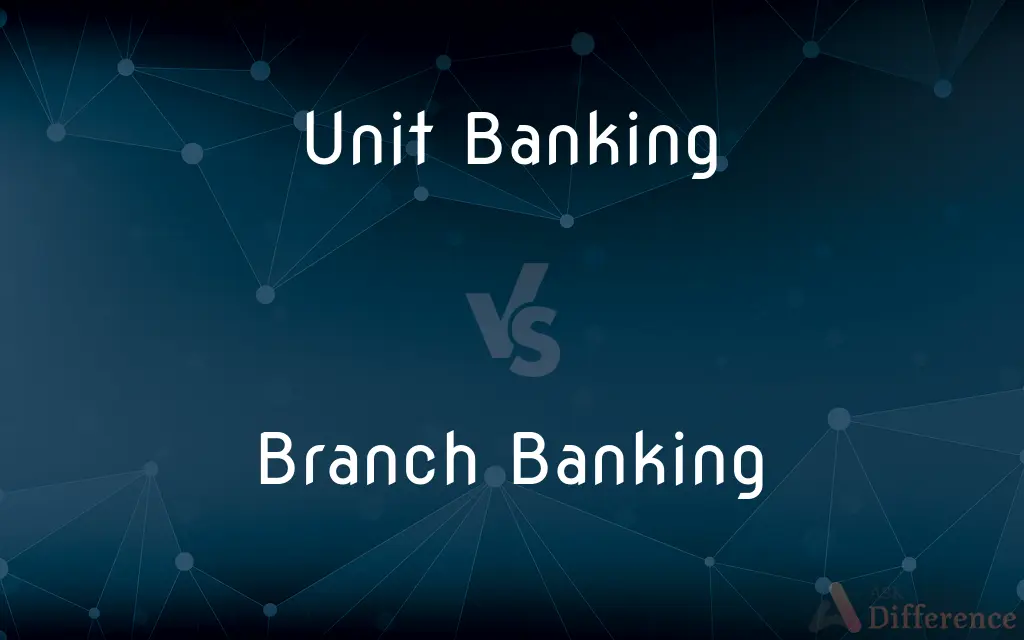Unit Banking vs. Branch Banking — What's the Difference?
By Tayyaba Rehman — Published on October 11, 2023
Unit Banking involves a single, independent bank providing services, limiting its scope and reach, while Branch Banking refers to a central bank operating multiple branches, expanding services and accessibility.

Difference Between Unit Banking and Branch Banking
Table of Contents
ADVERTISEMENT
Key Differences
Unit Banking and Branch Banking represent different banking structures. Unit Banking refers to a banking system where a single, independent bank operates in a limited area, providing services to the local community. It restricts its operations and services to a specific geographic area, offering personalized services, but may lack the extensive range of services and resources that larger banks provide. In contrast, Branch Banking is where a central bank operates several branches, either within a region or nationally, allowing a broader range of services and greater accessibility for customers.
In Unit Banking, the limited scope and localized services allow for a deeper understanding of the local market and customer needs, potentially leading to higher customer satisfaction. However, Branch Banking, with its expansive network, offers customers convenience and accessibility, providing services to a diverse customer base and potentially having more substantial financial resources and a wider range of services.
Unit Banking usually implies smaller operations with a focus on local communities, leading to strong customer relationships and personalized service. But, Branch Banking, through its multiple outlets, can leverage economies of scale, offering more competitive products and services, while also benefiting from risk diversification across different markets and customer segments.
The scale and reach of Unit Banking are confined, which might limit its ability to offer competitive products and may pose higher risks due to the lack of diversification. On the contrary, Branch Banking, with its extensive network and resources, can offer varied and competitive financial products and has the advantage of risk distribution, enhancing its stability and resilience.
In conclusion, while Unit Banking can offer more personalized and localized services, Branch Banking provides a wider range of services, accessibility, and stability due to its diversified operations and extensive network.
ADVERTISEMENT
Comparison Chart
Definition
Single, independent bank providing localized services.
A central bank operating multiple branches offering extensive services and accessibility.
Scope
Limited to a specific geographic area or community.
Can operate regionally or nationally, with a more extensive reach.
Service Range
May offer fewer services due to smaller operations.
Typically offers a wider range of services due to larger operations.
Customer Relationship
Stronger, more personalized due to localized focus.
May be less personalized but more diverse due to a broader customer base.
Risk and Stability
Higher risk due to lack of diversification; may have limited stability.
Benefits from risk diversification and typically has greater stability.
Compare with Definitions
Unit Banking
Unit Banking operates independently, usually serving a localized or specific community.
Unit Banking allowed the bank to tailor its services to the unique needs of the local community.
Branch Banking
In Branch Banking, each branch operates under the control of the central bank but provides services to different areas.
The various locations of Branch Banking allowed customers to conduct their banking activities seamlessly while traveling.
Unit Banking
Unit Banking may have limited resources and service range due to its confined operations.
The customers were content with Unit Banking but wished for a broader range of financial products.
Branch Banking
Branch Banking typically has a broader and more diverse customer base compared to unit banking.
The diverse clientele of Branch Banking benefited from the comprehensive and varied financial solutions offered.
Unit Banking
Unit Banking refers to a single, standalone bank providing services in a specific locale.
The small town primarily relied on Unit Banking, fostering a close relationship between the bank and the locals.
Branch Banking
Branch Banking offers extensive services and accessibility due to its widespread network.
People preferred Branch Banking for its diverse range of services and nationwide accessibility.
Unit Banking
Unit Banking often implies smaller-scale operations focused on local markets.
The residents appreciated the personalized services provided by Unit Banking in their area.
Branch Banking
Branch Banking refers to a banking system where a central bank operates multiple branches.
Branch Banking enabled customers to access banking services conveniently across various locations.
Unit Banking
In Unit Banking, the bank usually has a deeper understanding of its customer base and local market dynamics.
The tailor-made financial solutions offered by Unit Banking were well-received by the local businesses.
Branch Banking
Branch Banking can leverage economies of scale and risk diversification due to its larger operations.
Branch Banking offered competitive interest rates and innovative financial products due to its expansive operations.
Common Curiosities
How does Branch Banking operate?
Branch Banking operates by a central bank running multiple branches, either within a region or nationally, offering a wide range of services and greater accessibility to customers.
What is Unit Banking?
Unit Banking is a system where a single, independent bank provides services, usually in a specific geographic area or community.
How does Branch Banking enhance accessibility for customers?
Branch Banking enhances accessibility by operating multiple branches across different locations, allowing customers to access services from various places.
Does Unit Banking focus on local communities?
Yes, Unit Banking usually focuses on serving local communities, providing more personalized and tailored services based on local needs.
Is Unit Banking more risk-prone compared to Branch Banking?
Generally, Unit Banking might be more risk-prone due to its lack of diversification and limited geographic presence compared to Branch Banking.
Can Branch Banking offer more services than Unit Banking?
Typically, Branch Banking can offer a wider and more diverse range of services due to its larger scale and extensive network.
Is Unit Banking suitable for rural areas?
Yes, Unit Banking is often suitable for rural or specific communities due to its localized services and focus on personalized customer relationships.
Can Unit Banking offer competitive financial products?
Unit Banking might have limitations in offering competitive products due to its smaller scale and limited resources compared to Branch Banking.
How does Branch Banking benefit from economies of scale?
Branch Banking benefits from economies of scale by operating multiple branches, allowing it to offer more competitive services and products.
What is the advantage of Branch Banking in terms of risk?
Branch Banking has the advantage of risk diversification across different customer segments and geographic locations, enhancing its overall stability.
How does Unit Banking maintain customer relationships?
Unit Banking maintains stronger, more personalized customer relationships through its localized focus and deeper understanding of community needs.
Can Branch Banking serve diverse customer needs?
Yes, Branch Banking can serve diverse customer needs due to its extensive network and wider range of services.
Is Unit Banking confined to specific geographic areas?
Yes, Unit Banking usually operates within specific geographic areas or communities, offering localized services.
Which banking system is more resilient, Unit Banking or Branch Banking?
Generally, Branch Banking is considered more resilient due to its risk diversification and extensive network compared to the localized operations of Unit Banking.
Why do people prefer Branch Banking?
People might prefer Branch Banking due to its extensive service range, accessibility across multiple locations, and diversified risk.
Share Your Discovery

Previous Comparison
Primary Stakeholders vs. Secondary Stakeholders
Next Comparison
IPO vs. FPOAuthor Spotlight
Written by
Tayyaba RehmanTayyaba Rehman is a distinguished writer, currently serving as a primary contributor to askdifference.com. As a researcher in semantics and etymology, Tayyaba's passion for the complexity of languages and their distinctions has found a perfect home on the platform. Tayyaba delves into the intricacies of language, distinguishing between commonly confused words and phrases, thereby providing clarity for readers worldwide.














































